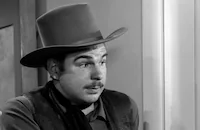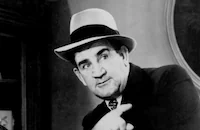The Burning Cross
Brief Synopsis
Cast & Crew
Walter Colmes
Hank Daniels
Virginia Patton
Dick Rich
Joel Fluellen
John Fostini
Film Details
Technical Specs

Synopsis
When wandering ex-serviceman Johnny Larrimer finally returns to his parents' home in Bridgeton, he is depressed to learn that not only has he lost his gas station job, but his best friend, Tony Areni, has become engaged to Johnny's childhood sweetheart, neighbor Doris Greene, as well. Feeling sorry for himself, Johnny begins drinking with locals Lud Harris and Tobey Mason. Lud tells the angry Johnny about an organization that is dedicated to "helping unemployed veterans," and the next day, after he has discussed Johnny with Mort Dauson and Howard Gibbons, leaders of the organization, Lud sends Johnny for a job interview at a machine shop. Although the unionized shop workers are on strike, Johnny accepts the job from the boss, Jim Todd, an organization member. As he is leaving the shop, however, Johnny is confronted and beaten by a striking worker. Later, at home, Johnny tells Doris that Tony, who did not serve in the war, is a double-crossing "slacker." Infuriated, Doris slaps Johnny, who then provokes a bar fight with Tony. Seeing their opportunity, Lud and Tobey invite Johnny to attend an organization meeting. During the meeting, Gibbons denounces the influx of foreigners to the town and urges his listeners to join one of the many "America Only" associations. Impressed, Johnny applies for membership and is soon initiated into the Ku Klux Klan. Soon after, a rash of violence against blacks, Jews and foreign-born businessmen begins. Tony then reveals to Johnny that he saw him participating in an attack on a Swedish-born florist and warns him that "next time" he will inform the police. Later, Tony is kidnapped by Klan members and dragged to an outdoor meeting. There, Tony witnesses the tar and feathering of one of the strikers and tries to run away. Unaware that Charlie West, a black farmer, is watching the scene from a tree, Lud shoots and kills Tony. Later, Walter Strickland, a special investigator, questions Johnny about Tony's death, but Johnny reveals nothing. After Strickland tells Hill, the local police chief, his suspicions that "nightriders" killed Tony, Hill, a Klan member, apprises Dauson of the investigation. Strickland then convinces Doris to help him uncover Tony's killer by reingratiating herself with Johnny, whom Strickland suspects is somehow involved. The guilt-ridden Johnny, meanwhile, quits his job and informs Lud that he is leaving the Klan. In response, Lud threatens to harm Johnny's parents, compelling Johnny to participate in the Klan's next undertaking--preventing blacks from registering to vote. Johnny is ordered to stop Charlie, an old family friend, from registering, but is unable to dissuade the proud farmer. That night, Charlie is attacked by cloaked Klansmen, and Charlie goes to Hill for help. After a trusting Charlie reveals to Hill that he witnessed Tony's murder, Hill notifies Dauson about the development. Later, Johnny confesses all to Doris and divulges that the Klan is planning an attack on Charlie. Doris, who has forgiven Johnny, tells Strickland about Charlie, and Strickland, in turn, asks Hill to stop the attack. That night, Lud shoots and kills the defiant Charlie, then orders that his house be set on fire with his wife and father trapped inside. Deducing that Johnny is the "squealer," Dauson instructs Lud to "make an example of him." At Doris' urging, Johnny, meanwhile, has confessed to his family and is going to see Strickland when his wheelchair-bound father is beaten, and he is kidnapped by two Klansmen. Just as Lud and the Klan are about to hang Johnny, the police, having tracked the Klansmen's car, arrive on the scene. Johnny pursues the fleeing Lud and beats him into unconsciousness. Later, Dauson and Hill are arrested, and Johnny signs a confession. After Strickland praises Johnny for his courage, Doris pledges to wait for him.

Director
Walter Colmes
Cast
Hank Daniels
Virginia Patton
Dick Rich

Joel Fluellen
John Fostini
Raymond Bond
Betty Roadman
Walden Boyle
Alexander Pope
Richard Bailey

Matt Willis

Ross Elliott

John Doucette

Tom Kennedy
Marjorie Manners
Ted Stanhope
Helen Servis
Clinton Rosemond
Glenn Allen
Maidie Norman
Jamesson Shade
Jack Shutta
Crew
George Bahr
Jason Bernie
Walter Colmes
Ted Larsen
Selvyn Levinson
Jacque Mapes
Ray Mercer
George Moskov
Ferol Redd
Ralph Stanley
Walter Strenge
Frank Sylos
James H. Wade
Aubrey Wisberg

Film Details
Technical Specs

Quotes
Trivia
Notes
Although a print of this film was not viewed, the above credits were taken from a cutting continuity deposited with the Copyright Office. The picture opens with a brief narrated montage depicting the history of the Ku Klux Klan in America. Voice-overs spoken by character "Johnny Larrimer" are heard intermittently throughout the film and are finally revealed to be his confession to the police. An article about the film in the September 1947 issue of Ebony magazine gives the following information about the production: Producer Selvyn Levinson got his inspiration for the project while he was serving in the military during World War II. At his unit in Chengtu, China, an African American staff sergeant was put in charge of an all-white aircraft battery, and Levinson was impressed with the way in which all of the soldiers worked together to make it the "most proficient...on the field." When Levinson sought financing for The Burning Cross, he was turned down by "every national bank in the country," according to the Ebony article. The picture, which cost $150,000 to make, was financed by "individuals interested in tolerance." Levinson also noted that while the writers with whom he consulted refused to "touch it," many actors volunteered their services on the film.
Hollywood Reporter news items and production charts add the following actors to the cast: Rory Mallinson, Betty McMahon, Peggy Wynne, Herbert Wilms, Tom Daly, Victor Zimmerman, Marion Brown, Bill Murphy and Mollie MacIntosh. Their participation in the completed film has not been confirmed, however. According to a Los Angeles Times news item, The Burning Cross was the first film to be shot at the newly renovated Motion Picture Center, formerly the Metro Pictures Corp. studio.
In a May 12, 1947 letter to producer-director Walter Colmes, contained in the MPAA/PCA files at the AMPAS Library, PCA director Joseph I. Breen approved the shooting script, but cautioned that "the Negroes throughout the production will at no time be shown as too subvervient, and that their dialogue will be cleaned up so that the English will be grammatical." Although Breen had only minor objections to the story, Hollywood Reporter announced in late September 1947 that the Virginia Board of Censors had banned the film, calling it "inhuman and an incitement to crime." The Board felt that the film might "arouse animosity" between blacks and whites, not "believed existing in Virginia." In October 1947, Variety announced that Screen Guild Productions had filed a lawsuit against the Virginia Board before the state court of appeals. The disposition of that suit is not known.












